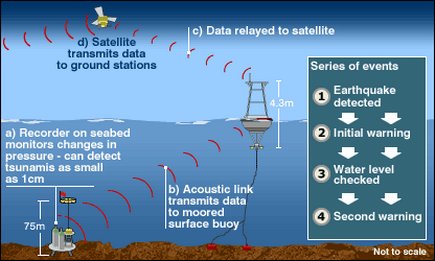2nd Lead (Adds background)
Paris meet discusses Asia Tsunami warning system
[TamilNet, Wednesday, 09 March 2005, 11:19 GMT]
Experts from Indian Ocean countries affected by December tsunami and other countries held discussions organized by the United Nations Educational Scientific and Cultural Organization's (UNESCO's) Intergovernmental Oceanographic Commission (IOC) from March 3 to 8, in Paris, sources said. As a first step towards this project Japan and US will provide warnings of seismic activity to the regions in Indian Ocean from a central building the location of which is yet to be decided.
 Tsunami Early warning (Photo: BBC)
Tsunami Early warning (Photo: BBC)
The meeting also decided, in a second phase, to upgrade the nearly 15 gauges already deployed in the region and to add new gauges close to Thailand, Malaysia and Indonesia, reports said.
The third phase will see the construction of a regional warning center which is linked to the underwater sensors and gauges acrosss the region to provide the nerve center for a comprehensive monitoring and alert station. This is expected to be completed by the end of 2006.
 |
| Richard W. Spinrad, Head of US delegation
|
Dr. Richard W Spinrad, Assistant Administrator of the National Oceanic and Atmospheric Administration (NOAA) Ocean Services and Coastal Zone Management, led the US delegation. Representatives from NOAA, US Geological Survey (USGS), National Science Foundation (NSF) and the Incorporated Research Institutions fro Seismology (IRIS) also attended the meeting.
Full text of the UN press release follows:
United Nations
Press release, March 3, 2005
Meeting in Paris to Plan Tsunami Early Warning System, 3-8 MARCH
GENEVA, 1 March (UNISDR) - Experts from Indian Ocean countries affected by the 26 December tsunami and other countries will gather in Paris this week to plan a coordinated tsunami early-warning system for the Indian Ocean. Organised by the United Nations Educational, Scientific and Cultural Organization’s (UNESCO) Intergovernmental Oceanographic Commission (IOC) from 3 to 8 March, the meeting follows discussions held during the World Conference on Disaster Reduction in Kobe, Japan, in January and other meetings in Asian countries over the past few weeks.
The participants will set out the basic infrastructure requirements for earthquake and ocean observation systems and national tsunami centres, and will consider the needs for public information and emergency management.
“Many people just think of a high-tech system with ocean sensors and a tsunami nerve centre, but much more is needed”, says Salvano Briceño, Director of the secretariat of the United Nations International Strategy for Disaster Reduction (ISDR). “If the warnings do not get to the people at risk and into public education and preparedness programmes, they will be ineffective.”
In its capacity as the international framework for disaster risk reduction, the ISDR seeks better coordination between the different organizations concerned with reducing disaster risk, including United Nations bodies, regional organizations and civil society bodies.
“Good coordination by the United Nations and other international organizations with governments and strong respect for country and community needs is essential in order to move this process forward speedily”, recalls Mr Briceño. “UNESCO’s Intergovernmental Oceanographic Commission has coordinated the Pacific Ocean tsunami warning system for 40 years, and is playing a critical role in steering action on a new system for the Indian Ocean, in partnership with other ISDR partners.” A preliminary system could be in place in the Indian Ocean by June 2006.
“Support for the development of a new tsunami early-warning system in the Indian Ocean is extremely high, so rapid progress can be expected”, adds Salvano Briceño. Some $8 million have already been provided by Japan, Sweden and Norway through the ISDR. The European Commission, Germany, Netherlands and the United States have offered further substantial amounts.
Thailand has offered $10 million to a special fund to support a regional warning centre and other countries in the region have committed to strong national initiatives.
The Paris technical meeting will concentrate on defining a work plan and timetable for the establishment of an early-warning system for tsunamis in the Indian Ocean. It will also consider the needs for other regions as part of a global tsunami early-warning system.
“Many other regions of the world are at risk, such as the Caribbean, Central America, the Mediterranean and the South-West Pacific region”, says Salvano Briceño. Many partners are calling for a comprehensive approach that not only includes all countries at risk, but also considers all of the hazards faced together, linking efforts on tsunamis to other risks like storms and floods.
Referring to the Hyogo Framework for Action for the decade adopted at the World Conference on Disaster Reduction in Kobe last month, Salvano Briceño emphasized the integration of disaster risk reduction as part of poverty reduction, environmental and sustainable development strategies.
Related Articles:07.01.05
Catastrophes of the past: poetic exaggeration or scientific .. 01.01.05
Idling monitoring equipment proves ineffective during quake,.. 27.12.04
A Nation Unprepared
External Links:








